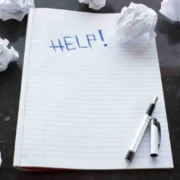Got Writer’s Block? A few tips for fighting back.
Got Writer’s Block? It happens to all of us.
You don’t have to be a writer to have writer’s block. In fact, any time you’re stuck with what to do or what to say – “What’s for dinner tonight? What movie should we watch? Where do we want to spend our next vacation?” – you’re experiencing in some way a form of this dreaded malady.
I’m hardly immune from writer’s block. I’ll admit to experiencing it to some degree whenever I sit down to write these blog posts or even a letter or email to a close friend. With so much going on in our world, it’s downright frustrating when you can’t think of what to write about. Fortunately, over the years, I’ve found a few effective ways for fighting back and getting the creative juices flowing again. See if any of these tips are helpful to you too.
1) Think first to avoid “Blank Page Syndrome.” The dreaded blank page (or screen) is the calling card of writer’s block – a vast expanse of blankness challenging you to fill the void with something worth reading. I avoid this syndrome by doing my mental work well before I sit down to start writing. Essentially, it’s all about thinking in advance what it is you want to say. Start by writing down fragments or short sentences, not worrying about format, grammar, organization, or even clarity. Just free yourself to write whatever comes to mind. Then, look over what you have and search for a structure. Back in the day I did this by cutting and pasting typed pages, but word processing makes the process oh so much easier. Do your homework and thought-work up front so when you sit down to write you’ll have your content and game plan for conquering the blank page.
2) Talk a walk (or engage in some other relaxing motion activity). Often a change of scenery, fresh air, or just feeling your heart and muscles in action can bring clarity and inspiration to your mind. Suddenly, in the midst of your walk, you may find the topic you want to write about. The words themselves might even start flowing into your thoughts. I love to walk but you might like yoga, Tai Chi, shooting baskets, swimming, or lifting weights. Move your body to move your mind.
3) Start out by writing it badly. Perfectionism can be the bane of our existence if we let it. Therefore, when you’re working to break through writer’s block, don’t let this tendency stand in the way. Just start writing, pounding the keys or moving the pen, to get something going. It needn’t be perfect or even close to perfect. Save those aspirations for subsequent review drafts. Just seeing words on paper or screen, any words, can be liberating and all you need to get going.
4) Start in the middle. We’ve been subconsciously trained from early childhood to approach the world in a linear manner. We’re told to perform a task by starting at the beginning and then proceeding to the middle and the end, in that order only. Writer’s block feeds off this notion that you have to start at the beginning, even when you’re unsure what that beginning is. So, Instead, start your story/script/blog/whatever where you’re surest about what it is you want to say. Maybe that’s in the middle, maybe it’s at the end. Maybe it is the beginning. Whatever. Just write what you have right now and take it from there.
5) Just relax. Writer’s block can be the source of considerable anxiety, especially when you’re facing a deadline or some other situation where you feel pressured to perform. Anxiety fuels desperation and a lack of confidence, hardly the recipe for creativity or success. Therefore, identify and practice the relaxation and mindfulness techniques (and there are plenty of them out there) that work for you. With calming thoughts your confidence will rise, and you’ll realize that you’re more than capable of writing something interesting and of value to readers. You can do this. Breathe deeply and believe in yourself.
6) Keep an Idea Log. Great ideas often leap into your head when you least expect them. They can even come to you in dreams. Whatever, the point is don’t commit these ideas to memory because they’re likely to evaporate and be lost to you forever. Keep an informal log of your good ideas and you’ll have a deep well to drawn upon when you need to write.
7) Observe the world closely. This seems rather obvious but you’d be surprised just how often we overlook what’s happening around us on both the local and global scale. The world is endlessly teeming with stories, ideas, and stimulating events. Watch the news, read the papers, follow events online. You’ll find topics of interest for sure.
8) Do a mental exercise or puzzle. Crossword puzzles are the classic example, but there are plenty of other ways to exercise your brain. Sudokus, Jumbles (my favorite), and Word Cyphers can energize your thought machine, ultimately helping you to overcome writer’s block.
9) Talk to a friend. It’s amazing what someone else’s point of view can do to help you find your own. Mention to this person that you’re dealing with writer’s block. You might be surprised at how their reply can break through your logjam.
10) Listen to music, watch a movie, read a book. Experience the originality and creativity of others as a prelude to prompting your own muse to start speaking to you again. You can find inspiration within the inspiration of others.
So those are a few ideas I’ve found useful. Perhaps you have a few of your own to add in. If so, I’d be happy to hear about them, as always.
Now that I’m unblocked enough to write this blog, can another project be close at hand?



